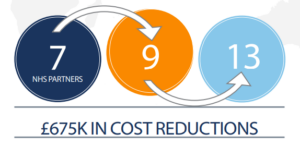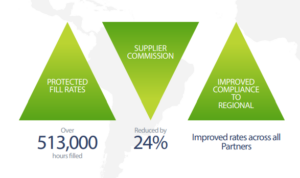Situation
A working group of thirteen like-minded NHS organisations in the West Midlands wanted to work together to develop regional controls and to drive their locum staffing costs down. The healthcare providers had established relationships with HealthTrust Europe (HTE) as a framework partner that had helped them source local temporary staffing solutions with high quality patient care at the heart. In connection with the project, the healthcare providers set out to secure a reduction in agency spend whilst delivering a range of successful outcomes to reduce cost, support patient services and enhance safe staffing.
Challenge
The West Midlands had a high vacancy rate for medical roles and a high spend on medical locums through agency suppliers. Wider workforce strategies were needed to improve the reduction in vacancies. There was a clear need for robust contracting and enhanced management of agency suppliers to control spend and for stakeholders to work more collaboratively to improve data visibility, quality and price.
Each Trust individually managed their own medical agency expenditure as a silo, engaging suppliers with different commercial terms and approaches to releasing shifts. Agency suppliers had an advantage in being able to engage Trusts in silo with limited controls on commissions and no controls on performance management.
A wider set of drivers (workforce planning issues, high vacancy rates, access to rostering and bank uptake) led to an environment where Trusts had less influence and paid an increased rate and commission in the process of engaging medical locums.. The competition for talent within the silos drove rates up, with Trusts less likely to engage collaboratively with regional peers to discuss local pressures or concerns.
HTE had previously worked closely with the regional Trusts and recommended a collaborative approach that would benefit the Trusts by controlling commissions, targeting market rate adherence, unifying contract terms and setting up more regular performance management to hold the supply chain to account.
Solution
HTE’s Total Workforce Solutions (TWS) team held talks with the healthcare providers and facilitated the collaborative working to tackle the problem. The group had an annualised spend of more than £42m on medical agency covering a total of 513,014 hours of supply. Organisational commitment from all parties was vital to ensure the project’s success and due to sheer geographical size, it took focus to establish the collaboration. The executive project sponsorship from HR and the commitment of steering group members were instrumental in promoting the approach.
The basis of the collaboration was to encourage the healthcare providers to develop a temporary workforce strategy which would see them combining their spend, using the same preferred supplier list (PSL), and working together to reduce costs across the region through effective performance management of suppliers. The TWS team liaised with the healthcare providers through the steering group to work together on an agency spend reduction plan. On a regular basis the healthcare providers shared their data, experience and knowledge to promote good practice between NHS organisations and target key deliverables that drive best value (quality, safety, service and price) outcomes.
This regular data sharing enabled HTE to conduct in-depth analysis and produce a balanced scorecard detailing information which highlighted the best performing supplier, average rate profiles, average rate per Trust and fill rate per provider to create a level playing field. This enabled providers and HTE to see where the healthcare providers were spending their budget and which areas were hard to fill, such as grade of doctor, specific shifts, and the percentage of shifts being filled by suppliers so that actions could be focused on specific target metrics.

The scope of the project was further widened from 6 members with circa £42m spend to 13 members with circa £95m spend, enhancing the leverage available. Collaboration and consistency eliminated the competition between NHS organisations which had previously been advantaging the suppliers and agency workers, giving healthcare providers access to key data and performance metrics to make effective sourcing decisions.
During the first three to four months the new strategy and rate card were adopted, and all relevant staff were made aware of the key contract terms and conditions. The healthcare providers had consistent access to HTE which offered hands on support and encouraged transparent working (including short term focused support for healthcare providers experiencing supply chain difficulties in adopting new practices). HTE arranged monthly ‘project health checks’ to mediate any issues and provide support to align to the new contract terms and process. Operating as a bridge between healthcare providers and suppliers, HTE had direct access to account managers and senior board stakeholders within the supply chain to support with any urgent issues the healthcare providers had and to ensure focus on the project deliverables.
Quality was enhanced by the provision of on-going monitoring of supplier performance which continually collected spend data from healthcare providers, direct engagement providers and the suppliers to capture a true, evidence-based reflection of performance across the region. This data was collected, monitored and fed back to healthcare providers regularly in the form of the balanced scorecard which was built to include all relevant metrics as requested by the participating Trusts.
Pricing was developed using an evidence based commercial strategy to drive reductions and savings, measuring key metrics effectively to allow operational and executive stakeholders to monitor project progress and successes. Where needed, healthcare providers used the collaboration to help fill shifts they found difficult to meet. HTE was able to, and continues to, act as a mediator to assist with rate negotiation, ensuring best value, and also as an ad hoc recruiter, assisting healthcare providers from time to time with hard to fill shifts.

Result
With support from HTE for the West Midlands medical agency project, the NHS has succeeded in its move towards collaborative working throughout the UK to help improve spend leverage, communication and create greater consistency within the temporary staffing market.
As a result of the collaboration between the healthcare providers, stakeholder cooperation and the partnership of HTE’s supplier community, cost reductions of more than £675,000 a year (during the NHS financial year of 2018-2019) were achieved by the healthcare providers including a 24% reduction in supplier commission rates and a marked reduction in average Total Charge Rates across key specialties and grades of medical locums.
Senior stakeholders were engaged through HR networks to expand the group to thirteen providers in November 2019, further strengthening the leverage of the healthcare providers and scope of the agreement to deliver benefits to the Acute Sector of the NHS across the Midlands.
The success of the NHS collaboration with HTE is on-going; HTE will be working on a renewal project in the 2022/23 financial year to support healthcare providers with navigating the latest market conditions and challenges.
For more information, contact our Customer Care Team on 0845 887 5000 or email customercare@htepg.com


